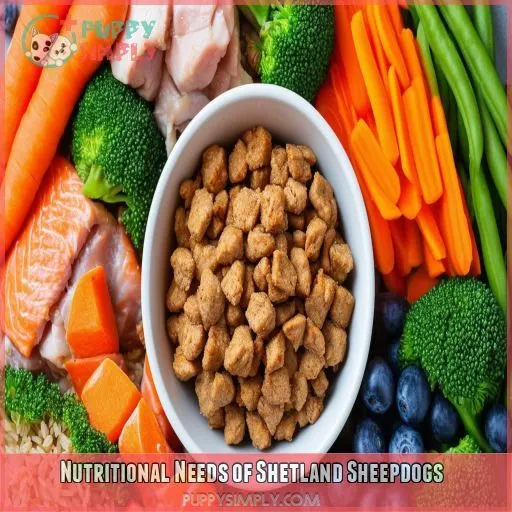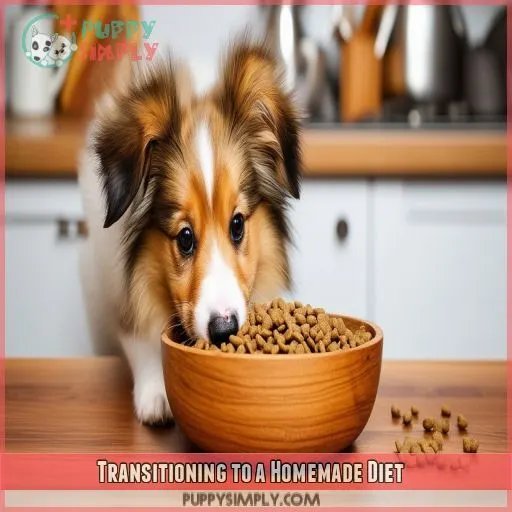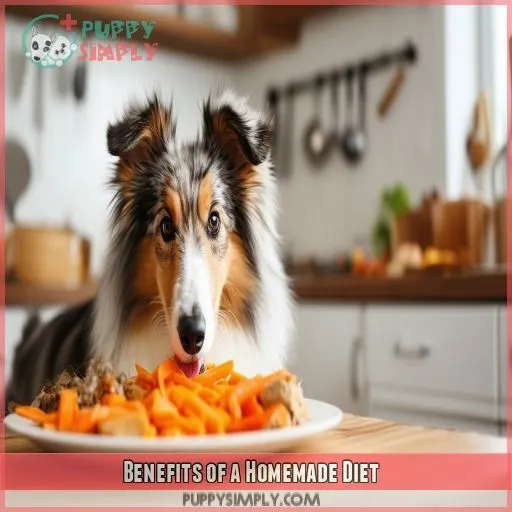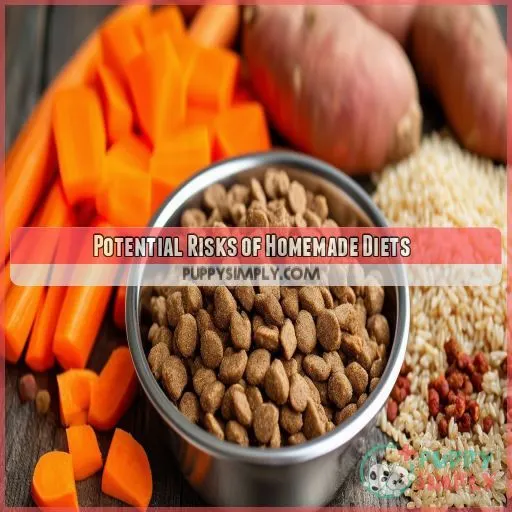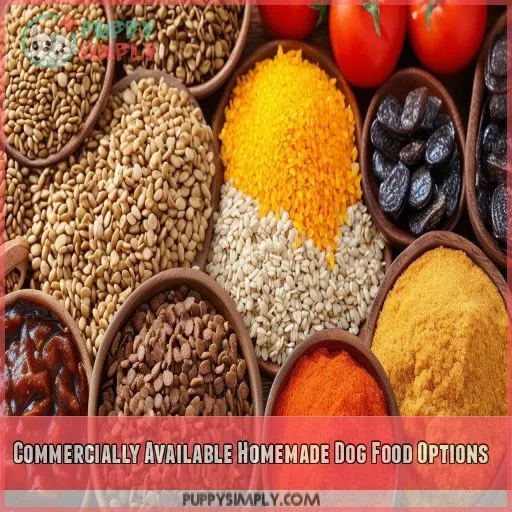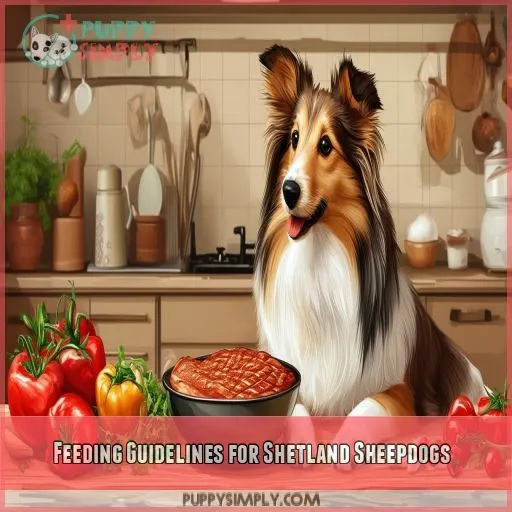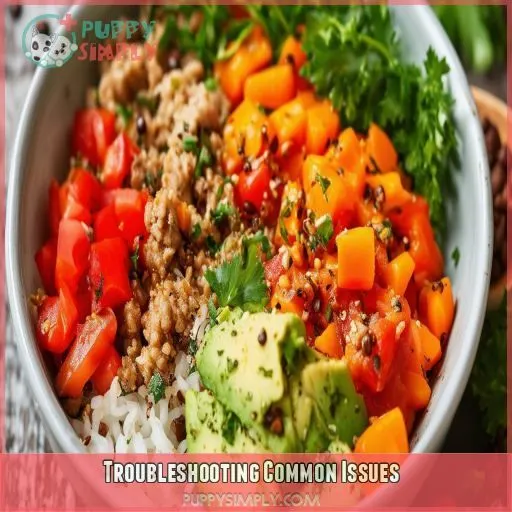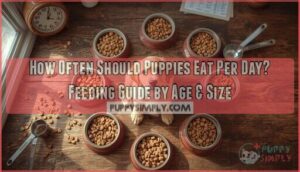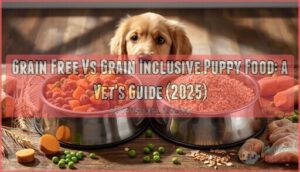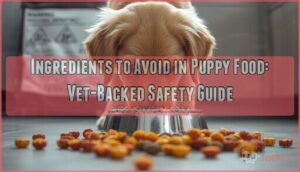This site is supported by our readers. We may earn a commission, at no cost to you, if you purchase through links.
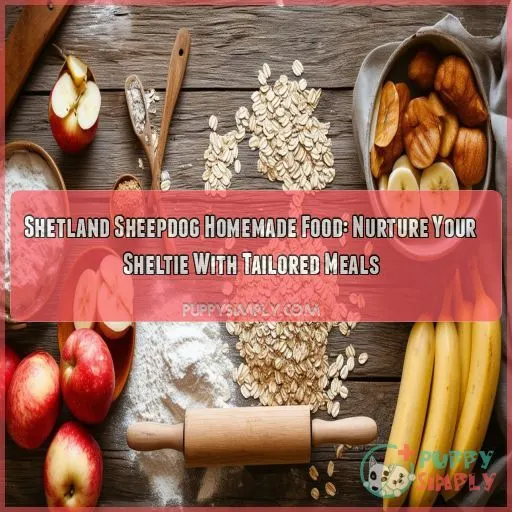
Homemade food can unlock the highest health, energy, and well-being for your Sheltie. In this guide, you will get paramount recipes with nutritional notes tailored to meet your Sheltie’s specific needs.
Clear, active steps will imprint your confidence in transitioning to home-cooked meals for balanced feeding to support your dog’s vitality and minimize health risks.
Get ready to raise your Sheltie with top-notch, individually tailored care
Table Of Contents
- Key Takeaways
- What is a Shetland Sheepdog?
- Nutritional Needs of Shetland Sheepdogs
- Homemade Diet Recipes for Shetland Sheepdogs
- Transitioning to a Homemade Diet
- Benefits of a Homemade Diet
- Potential Risks of Homemade Diets
- Commercially Available Homemade Dog Food Options
- Feeding Guidelines for Shetland Sheepdogs
- Troubleshooting Common Issues
- Frequently Asked Questions (FAQs)
- What is the best dog food for Shetland Sheepdogs?
- What is a Shetland Sheepdog?
- Can Shetland Sheepdogs eat sugar?
- Can a Shetland Sheepdog eat hydrolyzed protein?
- How often should I rotate protein sources?
- Which supplements are essential for homemade diets?
- What types of oils are best for dogs?
- Can homemade dog food be frozen for later use?
- What grains are safe to include in a diet?
- Conclusion
Key Takeaways
- Homemade meals can boost your Sheltie’s health like a rocket, leaving kibble in the dust!
- Tailor their meals to their unique needs, and watch their energy levels soar like a kite on a windy day!
- Transition gradually to homemade food to avoid tummy troubles. It’s like introducing a new friend – take it slow and steady!
- Monitor your Sheltie’s progress closely. If something’s not sitting right, don’t hesitate to consult your vet. They’re the experts at keeping your furry friend happy and healthy!
What is a Shetland Sheepdog?
Your Shetland Sheepdog, or Sheltie, is a small herding breed known for its intelligence, loyalty, and striking resemblance to a miniature Rough Collie. These energetic and affectionate dogs have a double coat that requires regular grooming, and they thrive on mental stimulation and physical activity
Breed Overview
You are about to embark upon a journey with the Shetland Sheepdog—a breed filled with history and beauty. From early days herding on Scotland’s Shetland Islands, these pint-sized herders capture hearts worldwide. Here’s what you need to know:
- They’re often confused with toy Collies
- Their double coats come in different colors, though sable, blue merle and black are very predominant.
- Their average lifespan is 12-14 years.
- Common health problems include hip dysplasia and eye problems.
Temperament and Personality
You’ll find your Sheltie as a beautiful mix of brains and play. These pups are sweet-natured and very responsive to please their owners; thus, training won’t give you much headache. They’ve been described as loyal and sometimes uptight with strangers.
Your Sheltie will surely appreciate loads of exercise and mental stimulation. Proper socialization is essential to prevent shyness.
Their herding instincts will crop up in defensively funny ways, such as trying to ‘herd’ family members!
Grooming Needs
Your Sheltie’s double coat needs regular attention. Brush them several times a week with a pin brush and undercoat rake to prevent matting and reduce shedding.
Bathe every 6-8 weeks using a gentle shampoo designed for long-haired breeds. Professional grooming can help maintain their coat, but don’t shave them.
A nutritious homemade diet with fresh ingredients can enhance coat health, complementing your grooming efforts
Nutritional Needs of Shetland Sheepdogs
To meet your Shetland Sheepdog’s nutritional needs, you’ll need to focus on providing the right balance of proteins, fats, carbohydrates, vitamins, and minerals. Shelties require high-quality protein sources, moderate fat content, and carefully selected carbohydrates, along with essential vitamins and minerals to support their active lifestyle and maintain their distinctive coat
Protein Requirements
Proteins form a basis for good health, like your Sheltie.
Good protein should be based on high-quality sources like lean meats, fish, and eggs. These provide all the essential amino acids necessary for developing muscles.
Rotate protein sources to ensure a complete and balanced amino acid profile. Consider adding digestive enzymes to ensure maximum absorption of all nutrients.
Remember that a balanced dog diet isn’t just about proteins; it’s about having the right mix of meat, bone, and other ingredients a dog food needs to contain
Fat and Carbohydrate Needs
The diet of your Sheltie should balance the amount of fat with carbohydrate intake. The amount of fat should range from 10 to 15% to maintain ideal weight conditions and a fine coat.
While dogs don’t require carbohydrates, moderate amounts can be added as extra energy sources. Observe your pup’s body condition for adjustments.
But remember that excess fat will cause gastrointestinal upset, just like excess carbs can make them gain weight. Tailor their meal to sustain their active metabolism and ensure they stay in top shape
Vitamin and Mineral Considerations
Vitamins and minerals in homemade meals for a Sheltie shouldn’t be overlooked.
Organ meats are dense with nutrients and provide many necessary vitamins, such as A and B12. Raw bones increase calcium levels for solid bones and bone health.
Vitamin supplementation may be required to avoid certain deficiencies, mainly in B-complex and vitamin E.
Supplements derived from high-quality food sources can address all nutritional deficiencies, ensuring your Shetland Sheepdog receives complete and balanced nutrition
Homemade Diet Recipes for Shetland Sheepdogs
You need to get balanced formulas with the proper protein sources and the correct addition of vegetables while making homemade meals for your Shetland Sheepdog. For this reason, you can ensure that your Sheltie gets the required amount of nutrition through supplementing food accordingly for their need.
Balanced Meal Formulas
You want to develop well-rounded meal formulas for your Sheltie that satisfy all his nutrient needs. Consider these key elements:
- Good protein-to-fat ratio
- Vitamins and minerals as essential nutrients
- Adequate fibre content
Mix lean meats with nutrient-dense vegetables and healthy fats for a well-balanced meal. Remember that your dog’s meal plan should be based on his age, weight, and activity level. Follow up on the nutritional analysis and health monitoring regularly to fine-tune your homemade recipes for the best results.
Protein Sources
You will want to include some protein sources within your Sheltie’s diet to produce a blend with a proper balance of amino acids. Lean meats like chicken, turkey, and fish have high biologic value proteins. Rotate beef, lamb, and eggs for ideal health.
When sourcing ingredients, consider proper digestive assimilation and bioavailability of the needed proteins. It’s important to note that quality counts; human-grade, whenever possible, must be preferred for this approach.
This supports the health of your Sheltie and satisfies their real ancestral dietary needs
Vegetable and Fruit Additions
- Leafy greens like kale and spinach
- Carrots for beta-carotene
- Pumpkin for fiber
- Broccoli for vitamin C
- Sweet potatoes for complex carbs
Stick to small portions of low-sugar fruits to prevent weight gain and dental issues
Supplements for Optimal Nutrition
Fruits and veggies are both nutritionally essential, but there’s a need for further joint, skin, and coat supplements to help your Sheltie maintain optimal health. The following is a basic guide relating to common supplements and their benefits:
| Supplement | Benefit | Recommended For |
|---|---|---|
| Omega-3s | Healthy skin and coat | All Shelties |
• Glucosamine• Joint support • Senior or active dogs •
Always consult your vet before adding supplements to your Sheltie’s diet.
Transitioning to a Homemade Diet
Before changing your Shetland Sheepdog’s food to homemade, though, you’ll want to introduce new foods gradually over 7-10 days to prevent stomach upset. You must be very observant of the change in response for your Sheltie because of the diet change, then frequently consult with your veterinarian to maintain correctness in new meals about nutritional needs.
Gradual Transition Process
Be slow when transitioning your Sheltie to a homemade diet. Mix small amounts with their current kibble, and gradually increase the homemade portion over 7-10 days.
Gradual transition minimizes the possibility of digestive upset. Observe the reaction of your pup and adjust accordingly.
If in doubt about how to diet or if your dog is at nutritional risk, consult your vet for personal advice regarding your dog’s food plan
Monitoring Your Dog’s Acclimation
Gradually introduce your Sheltie to homemade food while watching his progress. Check weight, energy levels, and stools daily for any signs of allergies or digestive upset.
Add or subtract calories accordingly to keep a proper weight.
While the transition period is different in each case, most dogs get used to homemade food within 1 to 2 weeks.
Don’t hesitate to take your dog to the vet if you notice any worrying symptoms during this transition period
Consulting With a Veterinarian
Before you dive into Homemade dog food for your Sheltie, there are some things you should consult a veterinarian about. They’ll help with:
- Personalised feeding advice specific to your dog’s health
- Advice on potential risks and allergies
- How to transition from commercial to homemade or raw diets
Your vet will walk you through nutritional concerns, treat food sensitivity issues, and prescribe supplements whenever needed. They’ll ensure all nutritious requirements for your Sheltie are met in this new diet and set you up for success in this fun journey.
Benefits of a Homemade Diet
Switching your Shetland Sheepdog to a homemade diet can lead to remarkable improvements in their overall health. You’ll likely notice enhanced skin and coat condition, increased energy levels, and a reduced risk of food-related allergies as you tailor their meals to their specific nutritional needs
Improved Skin and Coat Health
The benefit a homemade diet will give your Sheltie regarding skin and coat health will amaze you. The addition of natural oils, fish oil, and highly personalized meals is itself a holistic approach to nutrition that can be further enhanced with coat additives and supplements for the skin.
Their fur will shine with much less shedding, feel softer, and their overall health will improve. This improvement will be physically reflected by an enhanced coat
Increased Energy and Vitality
Immediately after changing to homemade food, you’ll realize an astonishing boost in energy and vitality in your Sheltie. Balance in nutrition is an important issue that ensures your pup gets the correct combination of nutrients for perfect health. Together with proper safety practices while handling food and concern for digestive system development, your furry friend shall be far from what you knew or expected him to be. Weight management also comes easily as there’s control over exactly what goes into each meal.
- Wagging tail with renewed eagerness during walks
- Bright, alert eyes that sparkle with life
- Light, playful zoomies around the house, even in older dogs
- Increased stamina during fetch or agility training
• A decided spring to their step, very reminiscent of their herding heritage
Reduced Risk of Allergies
By crafting your Sheltie’s meals, you’re taking control of their allergy prevention. Homemade diets allow you to pinpoint and eliminate potential triggers, boosting your pup’s immune system and improving skin health and coat quality. Here’s a quick guide to common allergens and alternatives:
| Common Allergens | Sheltie-Friendly Alternatives |
|---|---|
| Beef | Turkey or lamb |
| Chicken | Duck or fish |
| Wheat | Sweet potato or quinoa |
| Dairy | Coconut milk or goat’s milk |
Always consult your vet before making major dietary changes to avoid adverse reactions or food intolerances
Potential Risks of Homemade Diets
While homemade diets offer benefits, they also come with potential risks you should consider. Nutritional imbalances, food safety concerns, and the difficulty of consistently achieving balanced meals are key challenges you’ll need to address when preparing your Sheltie’s food at home
Nutritional Imbalances
You must watch out for nutritional deficiencies with homemade meals for your Sheltie. Homemade diets aren’t bound by the very rigid dog food standards and regulations that mainstream dog foods go through, so there’s an outstanding possibility that without the correct planning, your canine friend may miss certain elements.
There are several positive benefits cited about raw food, but ensuring that your Shetland Sheepdog transitions to a homemade diet filled with the proper aspects calls for detailed research and possibly nutritional supplementation.
Consult with a veterinary nutritionist to ensure you’re meeting the requirements of all dog food labeling for a balanced diet
Food Safety Concerns
Food Safety: The most crucial thing concerning preparing homemade meals for your Sheltie is food safety. Here, proper hygiene practices should be in order against foodborne illness threats.
Always source fresh ingredients; such ingredients won’t spoil if stored properly. Keep current on any dog food recalls and the standards of the industry.
Don’t fall for myths about dog foods. Instead, focus on safe preparation and storage techniques for the health of your Sheltie from your kitchen
Difficulty Achieving Balanced Meals
Achieving balanced meals for your Sheltie can be tricky. You’ll need to juggle ingredient substitutions, nutrition calculations, and cost comparisons.
Time constraints and dietary restrictions can complicate things further.
Dog food preparation, cooking, freezing, thawing, and portion control require careful planning.
It’s a bit like solving a puzzle – you’ve got to fit all the nutritional pieces together just right to keep your furry friend healthy and happy
Commercially Available Homemade Dog Food Options
If you’re looking for accessible alternatives to completely home-cooked meals for your Sheltie, consider freeze-dried or dehydrated formulas or meal delivery services that offer freshly cooked food. Such businesses sell well-balanced canine nutrition, but it’s still essential to compare their nutrient profiles against what your Shetland Sheepdog requires.
Freeze-Dried and Dehydrated Formulas
You’ll find freeze-dried and dehydrated formulas as convenient, shelf-stable options for your Sheltie’s homemade diet. These formulas offer a balance of convenience and nutrition, preserving the benefits of raw ingredients without the need for refrigeration. Here’s what you need to know:
- Nutrient retention: Freeze-drying and dehydration preserve essential nutrients
- Texture variety: Choose from crunchy to rehydrated soft options
- Palatability: Enhanced flavors often appeal to picky eaters
Consider these formulas as a time-saving alternative to traditional homemade meals
Freshly Prepared Meal Delivery Services
If you haven’t got enough time and insist on fresh, homemade meals for your Sheltie, then freshly cooked meal delivery services can be your salvation. These subscription boxes allow for convenience—the much-needed factor in meal provision—since they bring pre-portioned meals to your doorstep.
As pricey as they may be compared to any DIY projects, they save you time from the kitchen. Follow the instructions of the provider about frequency and food safety when reheating and serving
Comparison of Nutrient Profiles
Comparing the nutrient profiles in homemade and commercial options gives some differences in vitamin and mineral content. Fresh ingredients in homemade dog food provide more antioxidants and probiotics, while commercially available ones contain prebiotics and added fiber. But the inherent risks in homemade plans through imbalances can be debunked because their nutrient profiles can be assessed with expert consultation.
Feeding Guidelines for Shetland Sheepdogs
Feed your Shetland Sheepdog varying portion sizes of homemade food based on their ideal weight, then adjust accordingly based on individual activity levels. Monitor your dog’s body condition regularly to ensure that they maintain a healthy weight.
Portion Sizes Based on Weight
Feeding portion recommendations for Shetland Sheepdogs are given based on their weight. A Sheltie would typically require 2-4% of ideal body weight daily.
For example, a 20-pound Sheltie requires around 0.4 to 0.8 pounds daily.
Be sure to include everything their bodies need in the diet.
Most importantly, meal planning is vital for maintaining proper weight and avoiding food toxicity in dogs.
Steer clear of dangerous dog foods
Adjusting for Activity Levels
Bring into line portions associated with an activity level of your Sheltie.
The more active a dog is, the more calories it burns, so more food should be given.
Much in the same concept, less active dogs also require less food.
Monitor your dog’s lifestyle, age differences, and any special needs to find the right balance.
Look closely for signs such as weight change or energy levels to know whether you’re feeding them the right amount
Monitoring Body Condition
Check the body condition of your Shetland Sheepdog regularly for optimum health. Look out for:
- Clearly defined waist
- Ribs easily felt but not visible
- Balanced ratio of muscle and fat
- Stable weight over time
- Energy levels matching activity
Regular adjustments will keep your Sheltie at an ideal weight, which will help to add lean muscle mass and overall vitality.
Troubleshooting Common Issues
Mix and adjust ingredients, and add them slowly to watch for digestive upset, which could be a common problem in your Sheltie’s homemade diet.
If this is because of some type of finickiness or an inability to succeed at keeping a healthy weight, it might be due to alternating protein sources and having different portion sizes.
Consult with your vet for advice tailored to your situation
Digestive Upset
In Shelties, digestive upset can include food sensitivity. Add digestive enzymes to their diet to achieve the right stool consistency. Always provide fresh water to maintain appropriate hydration. If this problem continues, consult a veterinarian for advice on meal adjustments. You’ll assuredly keep your Sheltie’s digestive health in check by monitoring diet changes and symptoms closely.
Picky Eating
When dealing with picky eating, observe your Sheltie’s food preferences. Introduce new foods gradually, mixing them with familiar items. Use behavioral techniques like positive reinforcement to encourage eating. Alternate feeding methods, including hand-feeding or puzzle feeders, can make mealtime engaging. Monitor for underlying issues that might cause pickiness, ensuring a stress-free eating environment
Maintaining a Healthy Weight
Keep your Shetland Sheepdog at a healthy weight with some calorie awareness and meal planning.
Add a little exercise to the routine to help him be lithe.
Schedule regular weight checks with the vet for consultation and advice regarding his weight management.
Avoid overfeeding; measure portions correctly.
Maintaining an ideal weight is essential for a Sheltie’s good health and keeping him clear of diseases
Frequently Asked Questions (FAQs)
What is the best dog food for Shetland Sheepdogs?
For Shetland Sheepdogs, the best dog food options include high-quality brands like Farmina, Annamaet, Dr. Tim’s, Nature’s Logic, and Fromm. These provide balanced nutrition and support your pup’s overall health and well-being
What is a Shetland Sheepdog?
Shetland Sheepdogs, or Shelties, are intelligent, herding dogs known for their long, dense coat and affectionate nature. You might worry about shedding, but regular grooming keeps their beautiful coat manageable and your home fur-free
Can Shetland Sheepdogs eat sugar?
Shetland Sheepdogs shouldn’t eat sugar. High sugar content can lead to obesity, dental issues, and potential diabetes. Opt for healthier treats like vegetables or certain lean meats to keep your dog healthy and happy
Can a Shetland Sheepdog eat hydrolyzed protein?
Imagine finding a golden key to your Shetland Sheepdog’s health—yes, they can eat hydrolyzed protein. It’s great for dogs with allergies because it breaks proteins into smaller pieces, making them easier to digest
How often should I rotate protein sources?
In a dog’s diet, the rotation of protein sources can be done every 2-4 weeks to maintain variety and nutritional value. This will ensure that your dog includes many amino acids and other micronutrients in their diet.
Which supplements are essential for homemade diets?
Begin with calcium and fish oil supplements for omega-3 fatty acids, vitamin E, and a balanced multivitamin. You may also add organ meats in small portions to increase the intake of vitamins and minerals needed for optimum health.
What types of oils are best for dogs?
Imagine drizzling high-quality fish oil or flaxseed oil over your dog’s food; it’s both nutritious and tasty. These oils provide essential omega-3 fatty acids that support healthy skin, a shiny coat, and reduce inflammation
Can homemade dog food be frozen for later use?
Yes, you can freeze homemade dog food for later use. Place it in airtight containers or freezer bags. Always thaw completely before serving to keep the nutritional value and to ensure safe consumption for your dog.
What grains are safe to include in a diet?
Safe grains that can form part of a dog’s diet include brown rice, oatmeal, quinoa, and barley. Grains provide bang for the buck in many valuable areas: nutrients, fiber for digestion, and overall well-being. Just be sure the grains are always well-cooked to allow easy digestion.
Conclusion
Imagine your Shetland Sheepdog at its very best after each meal you lovingly make by hand.
Adopting a homemade diet means giving your Sheltie better health, strength, and happiness.
Balanced recipes, nutritional knowledge, careful monitoring—the combination that will successfully bring you both to transition into and maintain the safety of a homemade diet.
Remember how you guarantee the homemade food of your Shetland Sheepdog satisfies his particular needs; this is how you take care of him the very best—on one way toward a longer, healthier life together


